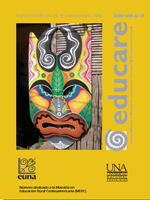Propuesta de alfabetización de educación no formal, para hombres, mujeres y obreros inmigrantes nicaragüenses
DOI:
https://doi.org/10.15359/ree.12-Ext.12Keywords:
literacy, immigrants, informal educationAbstract
This article summarizes the main findings of a research on literacy made with immigrant Nicaraguan men and women workers residing in Costa Rica, specifically with parents from students at the Gonzalo Monge School in Pital, San Carlos.
In this investigation, the more relevant motives for these Nicaraguan immigrants to come to Costa Rica are established. In addition, some of their needs living in this country are stipulated as well as the role of informal education in their lives.
It is clearly important to design a literacy proposal on informal education that allows immigrant Nicaraguan men and women workers to prepare and educate for life and work.
According to the Project for Latin America and the Caribbean, Education for Everyone program, education is understood as one basic need of the person: every person –child, young or adult- must have the basic opportunity of taking advantage of education. These needs include not only essential tools for learning (such as reading, writing, learning problems…), but also basic learning contents required for human beings to: survive, develop their capacities, live and work with dignity, fully participate on development, improve the quality of their lives, take their fundamental decisions and continue learning.
References
Brenes, G. (1999). Estimación del volumen y caracerísticas sociodemográficas de los inmigrantes
nicaragüenses. Tesis de maestría para la otención del título de Magíster. Sistema de Estudios
de Posgrado, Escuela de Estadística, Universidad de Costa Rica. Costa Rica.
Castro, C. (2002). Migración nicaragüense en Costa Rica: población, empleo y necesidades insatisfechas.
San José, Costa Rica: Universidad de Costa Rica, Facultad de Ciencias Sociales.
Cortés, A. (2006). Informe sobre el estado de la comunidad nicaragüense en Costa Rica. San José,
Costa Rica.
Instituto Nacional de Estadística y Censos (2001). “IX Censo Nacional de Población y V de
Vivienda: Resultados generales”. Consultado el dia, mes de año de en http://www.inec.go.cr/
INEC_DIS/Publicaciones/archivos%20SerieCensal%20xls/ResulCenso2000.pdf
UNESCO-OREALC. (1990). Declaración Mundial sobre Educación para todos. Boletín del proyecto
principal de educación en América Latina y el Caribe Nº 21, pp. 8-26. Santiago, Chile:
UNESCO-OREALC.
Mojica, F. J. Instituto de Estudios Sociales en población. Heredia, Costa Rica: Universidad Nacional
(IDESPO).
Morales, A. y Castro, C. (2002). Redes transfronterizas, sociedad, empleo y migración entre
Nicaragua y Costa Rica. Costa Rica: FLACSO.
Organización Internacional para las Migraciones [OIM]. (2001). Estudio Binacional: Situación
migratoria entre Costa Rica y Nicaragua. San José, Costa Rica.
Ooijens, J. y van Kampen, P. (2001). Educación no formal y exclusión social en Centroamérica. En
L. Lázaro (ed.). Problemas y desafíos para la educación en el siglo XXI en Europa y América
Latina (pp. 147-162 ). Valencia: Universidad de Valencia.
Proyecto Estado de la Región. (2003). Segundo informe sobre desarrollo humano en Centroamérica
y Panamá del año 2003. San José, Costa Rica: Proyecto Estado de la Nación.
Vera G., R. (1985, Noviembre). Proyecto principal de educación para Améria Latina y el Caribe.
En R. Vera (Ed.), Seminario Técnico Regional sobre Formación de Educadores Polivalentes
para Comunidades Rurales. Paipa, Colombia: OREALC-UNESCO.
Downloads
Published
How to Cite
Issue
Section
License
1. In case the submitted paper is accepted for publication, the author(s) FREELY, COSTLESS, EXCLUSIVELY AND FOR AN INDEFINITE TERM transfer copyrights and patrimonial rights to Universidad Nacional (UNA, Costa Rica). For more details check the Originality Statement and Copyright Transfer Agreement
2. REUTILIZATION RIGHTS: UNA authorizes authors to use, for any purpose (among them selfarchiving or autoarchiving) and to publish in the Internet in any electronic site, the paper´'s final version, both approved and published (post print), as long as it is done with a non commercial purpose, does not generate derivates without previous consentment and recognizes both publisher's name and authorship.
3. The submission and possible publication of the paper in the Educare Electronic Journal is ruled by the Journal’s editorial policies, the institutional rules of Universidad Nacional and the laws of the Republic of Costa Rica. Additionally, any possible difference of opinion or future dispute shall be settled in accordance with the mechanisms of Alternative Dispute Resolution and the Costa Rican Jurisdiction.
4. In all cases, it is understood that the opinions issued are those of the authors and do not necessarily reflect the position and opinion of Educare, CIDE or Universidad Nacional, Costa Rica. It is also understood that, in the exercise of academic freedom, the authors have carried out a rogorous scientific-academic process of research, reflection and argumentation thar lays within the thematic scope of interest of the Journal.
5. The papers published by Educare Electronic Journal use a Creative Commons License:














 The articles published by Educare Electronic Journal can be shared with a Creative Commons License:
The articles published by Educare Electronic Journal can be shared with a Creative Commons License: 



